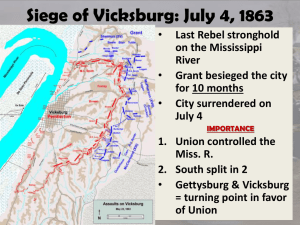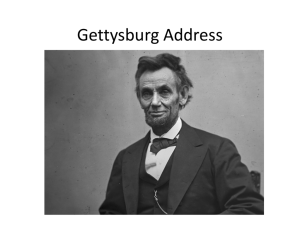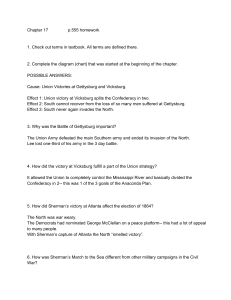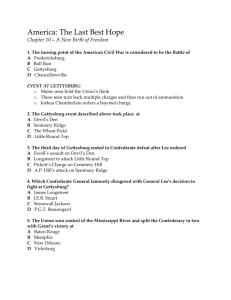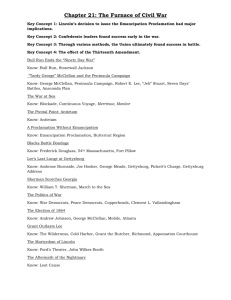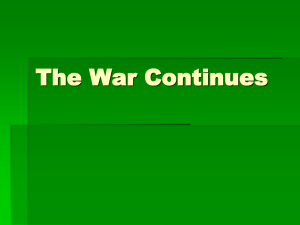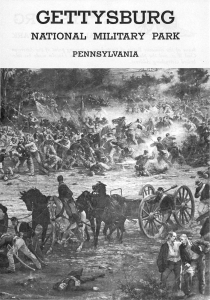Eyewitness Account of the Battle of Gettysburg
advertisement
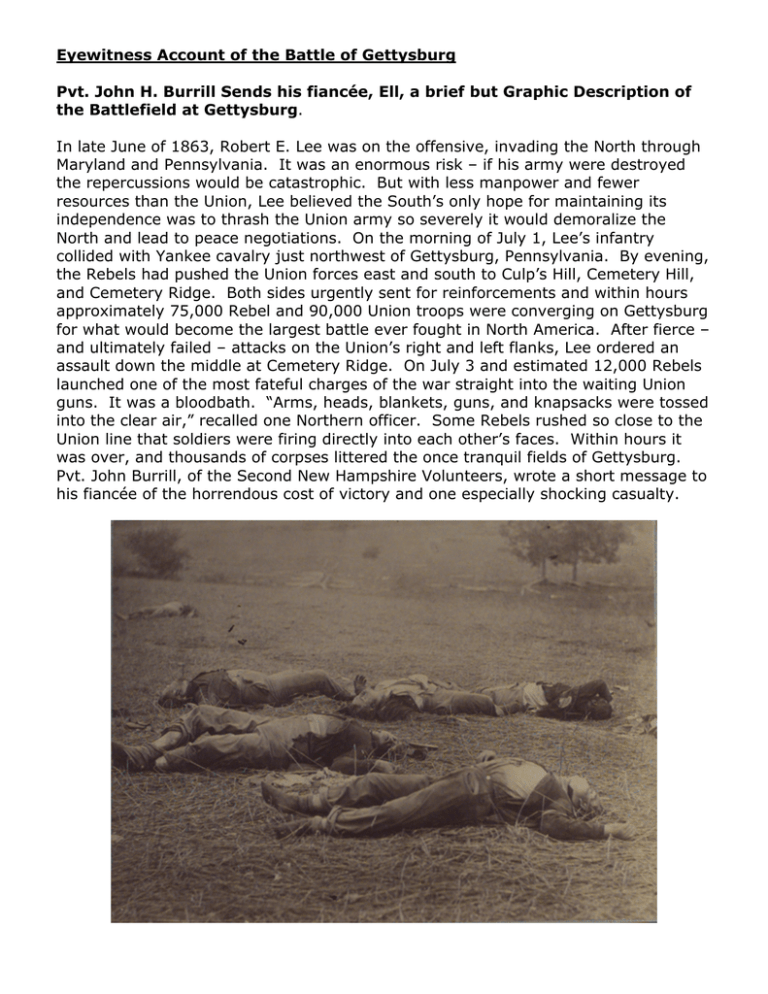
Eyewitness Account of the Battle of Gettysburg Pvt. John H. Burrill Sends his fiancée, Ell, a brief but Graphic Description of the Battlefield at Gettysburg. In late June of 1863, Robert E. Lee was on the offensive, invading the North through Maryland and Pennsylvania. It was an enormous risk – if his army were destroyed the repercussions would be catastrophic. But with less manpower and fewer resources than the Union, Lee believed the South’s only hope for maintaining its independence was to thrash the Union army so severely it would demoralize the North and lead to peace negotiations. On the morning of July 1, Lee’s infantry collided with Yankee cavalry just northwest of Gettysburg, Pennsylvania. By evening, the Rebels had pushed the Union forces east and south to Culp’s Hill, Cemetery Hill, and Cemetery Ridge. Both sides urgently sent for reinforcements and within hours approximately 75,000 Rebel and 90,000 Union troops were converging on Gettysburg for what would become the largest battle ever fought in North America. After fierce – and ultimately failed – attacks on the Union’s right and left flanks, Lee ordered an assault down the middle at Cemetery Ridge. On July 3 and estimated 12,000 Rebels launched one of the most fateful charges of the war straight into the waiting Union guns. It was a bloodbath. “Arms, heads, blankets, guns, and knapsacks were tossed into the clear air,” recalled one Northern officer. Some Rebels rushed so close to the Union line that soldiers were firing directly into each other’s faces. Within hours it was over, and thousands of corpses littered the once tranquil fields of Gettysburg. Pvt. John Burrill, of the Second New Hampshire Volunteers, wrote a short message to his fiancée of the horrendous cost of victory and one especially shocking casualty. Gettysburg, PA. July 6th, 1863 Dear Ell, This is the third letter I have written you since receiving any from you but such is the peculiarity of them. My last was from Emmetsburg before our fight here. I just wrote a line home this morning. It rained then and we were expecting to leave and did, but came back soon from where we started. We have packed up once more since, but did not go. You will want me to tell you of the battle. It was awful. Language will not convey an idea. We were not under fire till 2 or 3 o’clock in the afternoon. We then got under a fierce artillery fire, but with not damage. We then moved to another position near a peach orchard. Then under another heavy fire that made the earth tremble and the air shook and was so full of smoke you could not see. A good many of our Regt. Were shot there. We were supporting a battery. We were soon ordered to move forward which we did. We drove them, but what is that? They have turned back and are on our right flank. We have to fall back. They pour an awful fire into us. Men dropped fast. They could not stand it. We were forced to yield our ground. Other troops soon came – the 6th Corps. Our regiment went into the fight with 338 men. All we can muster now is not far from 175. Our company has 3 killed and 15 wounded – some of the latter are slight. A loss of 17 officers out of 30. The loss of our Corps is 4600, or about, one-half. I went over the battlefield before the men were buried and they lay awful thick, I can assure you. I have been over other fields but never one like this. In one place I counted 16 in a spot no larger than your kitchen. It was a hard sight. They had turned black and swollen to twice their natural size. Yesterday was the day I went over it. In going over, I saw one man who did not look like the rest. He was not black or swollen. He was alive. He could move of his hands a little. I went up to him and saw the top of his head was blown off. I gave him a little water – got some help – put him on a blanket and carried him to an old barn where he would get attention. He was about as hard looking man as I every saw and I have seen many. I have seen men torn to pieces in almost every shape and mind nothing about it, but not so with this one. The Fitzwilliam boys are all well but J.B. Fiske. He is wounded and I don’t know where he is. Will write some more next time. Write soon and oblige, Yours truly, Johnny There were over 51,000 casualties in all at Gettysburg – 28,000 Confederate, 23,000 Union. Watching his soldiers getting slaughtered, Lee was overheard to say, “All this has been my fault.” (Lee offered his resignation, but Confederate President Jefferson Davis would not accept it.) As the Rebel army limped back to Virginia, they learned that Vicksburg had fallen on July 4 as well. President Lincoln was relieved by the Union triumph, but infuriated that Meade did not pursue the Army of Northern Virginia aggressively enough and destroy it while he had the chance. Meade countered that his men were too weary to do so. Over four and a half months later, on November 19, President Lincoln traveled to the battlefield to dedicate the Gettysburg National Cemetery. The president’s speech would be criticized by reporters and even friends as “dull,” “commonplace,” and a “flat failure.” But over time, Lincoln’s Gettysburg Address would be hailed as one of the most profound and influential orations delivered in the course of American – if not world – history.
